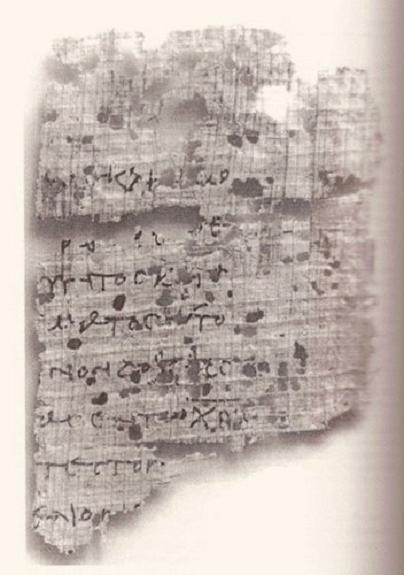| Change to Book/Chapter View |
|
|
|
Translation process is ongoing. For current status see details |
|
|

Papyrus 92 Discovered: Narmuthis, Egypt in 1969 Location: Cairo, Egypt; Egyptian Museum of Antiquities Contents: Ephesians 1:11-13, 19-21; 2 Thessalonians 1:4-5, 11-12
Ephesians 1 11 We were [..] 19 and what is the exceeding[1] greatness of his power toward us who believe, according to that working of the strength of his might 20 which he worked in Christ, when he raised him from the dead and made him to sit at his right hand in the heavenly places, 21 far above all rule, authority, power, dominion, and every name that is named, not only in this age, but also in that which is to come. [..]
2 Thessalonians 1 4 so that we ourselves boast about you in the assemblies of God for your perseverance and faith in all your persecutions and in the afflictions which you endure. 5 This is an obvious sign of the righteous judgment of God, to the end that you may be counted worthy of God’s Kingdom, for which you also suffer. [..] 11 To this end we also pray always for you, that our God may count you worthy of your calling, and fulfill every desire of goodness and work of faith with power, 12 that the name of our Lord Jesus may be glorified in you, and you in him, according to the grace of our God and the Lord Jesus Christ.
[1] The scribe wrote “ploutos,” the word for wealth, then wrote over it with “huperballon,” the word for exceedingly. |
How to read these pages: • The
translation to the left is based on the World English Bible. Words in regular
black font are words in the manuscript matching the Majority Text for that
passage. • Words
in italics cannot be seen in the manuscript, since the manuscript is
fragmentary. These words are supplied for readability by the World English
Bible translation. • Words
present in the manuscript but with some letters unreadable or missing are in blue
like this: blue. One Greek word often is
translated into multiple English words, and when this occurs, all the English
words are in blue. • Words
present in the manuscript but with spelling or trivial word order differences that do not affect the
meaning are in green like this: green. • If
the manuscript is different from the Majority Text, words in the Majority
Text that are missing from the text of the manuscript are marked through in red
like this: • If the manuscript is different from the Majority Text, words in the manuscript that are not in the Majority Text are underlined in red like this: new words.If the manuscript differs from the Majority Text yet matches another well-known text, this is noted in the footnotes.
|
